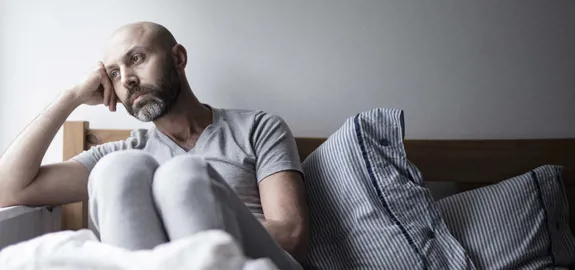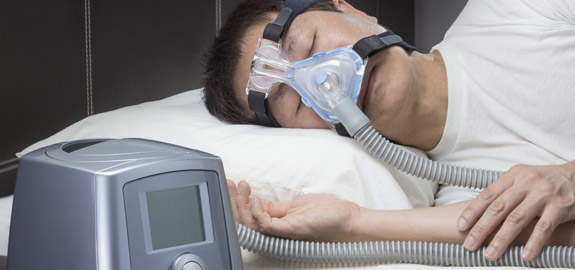
More than 50 million Americans have a sleep disorder according to the Centers for Disease Control and Prevention.
Up to 10 percent of adults in the U.S. meet the criteria for insomnia, the most common sleep disorder. And many more complain of “significant sleep problems.” 35 percent of Americans of all ages describe their sleep quality as “poor” or “only fair.”
And sleep issues cause problems outside the bedroom, too. They cost the people who experience them quite a bit of money. The National Center for Complementary and Integrative Health (or NCCIH) estimates that sleep disorders are responsible for $16 billion in medical bills each year.
So, does health insurance cover you if sleeping woes take you to your doctor, a sleep lab, or a CPAP provider? In most cases, yes, health insurance will help pay for sleep disorder treatments. But it depends on the type of health plan you have, as well as the deductible and out-of-pocket costs tied to it.
We’ll touch on the most common sleep disorders, how to treat them, and whether those treatments are covered. We’ll also discuss treatment costs for people without health insurance.
What are the most common sleep disorders?
According to the NCCIH, there are more than 80 different sleep disorders. Here are the four most common ones:
- Insomnia: Simply put, insomnia is difficulty falling or staying asleep. There are varying levels of severity, from acute to chronic insomnia. It’s the most common sleep disorder, with about one in three people suffering from mild insomnia.
- Sleep apnea: According to the Mayo Clinic, sleep apnea is “a potentially serious sleep disorder in which breathing repeatedly stops and starts.” It’s a serious condition and it can lead to severe health problems.
- Narcolepsy: The National Sleep Foundation describes narcolepsy as “excessive sleepiness, sleep paralysis, hallucinations, and in some cases episodes of cataplexy.” Those bouts of sleepiness often lead to “sleep attacks” that can and do hit at any time.
- Restless leg syndrome: Restless leg syndrome (RLS) “condition that causes an uncontrollable urge to move your legs, usually because of an uncomfortable sensation,” according to the Mayo Clinic. It usually impacts people at night when they’re lying down.
How do health or medical professionals diagnose sleep disorders?
Medical professionals diagnose sleep disorders in a number of ways.
First, they usually look at your medical history to see if anything explains your sleep problems. Quite a few health issues can cause sleep disorders. For example, being overweight or obese increases your risk of developing sleep apnea. Diabetes and high blood pressure also increase that risk. Arthritis, asthma, and depression increase your risk of insomnia.
Your doctor may also conduct a physical exam. Your tongue, tonsils, or soft tissues in the nose or throat can cause sleeping issues.
They might ask you to keep a sleep diary for a week or two. In most cases, you’ll be asked to record what you eat and drink, medications you take, and how you feel throughout the day.
Depending on the results, you may get referred to a sleep specialist. And they might have you take part in a sleep study. They’ll analyze your sleeping habits – either at home or in a lab – to diagnose your problems.
Does health insurance cover the diagnosis and treatment of sleep disorders?
In general, yes, health insurance plans usually cover the diagnosis and treatment of most sleep disorders.
That includes coverage you get from:
- An employer
- The Affordable Care Act (also known as the ACA or Obamacare) marketplace
- An insurance company
- Medicaid
- Medicare
This doesn’t mean every single health plan pays for all kinds of sleep-disorder treatment. Some policies cover more of these treatments than others. And some do a better job of covering them than others.
The same is true when it comes to diagnosing sleep disorders. Your health insurance plan should pick up most of the cost of seeing your doctor about sleep issues. But it may or may not pay for you to see a specialist or do a sleep study.
How can you find out if your health plan covers the diagnosis or treatment of a sleep disorder? Look over the policy itself. If that doesn’t clear things up, talk to someone in human resources (if yours is a job-based plan) or contact your insurance company.
Medicaid and Medicare do a surprisingly good job of covering the diagnosis and treatment of sleep disorders. Both cover in-lab and at-home sleep tests if a doctor orders them. They also cover breathing machines like CPAPs with physician involvement and approval.
Each sleep disorder treatment is treated differently by insurance. Below, we’ll go over the most common treatments, and whether they’re covered.
How do medical professionals treat sleep disorders? Does health insurance cover it?
Health and medical professionals treat sleep disorders in a number of ways.
Treatments for common sleep disorders include lifestyle changes, behavioral therapy, medications, breathing devices, oral guards, and surgery.
Lifestyle changes
Changing your day-to-day can alleviate the symptoms of a lot of sleep disorders. A few examples:
- Losing weight, avoiding alcohol, and sleeping on your side can help with obstructive sleep apnea.
- Going to bed and waking up at a fixed time can help with insomnia. As can avoiding alcohol, caffeine, and exercise close to bedtime.
- Regulating your sleep schedule can help with narcolepsy, too. As do scheduling daytime naps.
Behavioral therapy
Your physician may suggest behavioral therapy if you have issues sleeping. It can help you zero in on and change behaviors that keep you from sleeping well. Or it can teach you behaviors that promote good sleeping habits.
Does health insurance cover behavioral therapy?
Maybe. If your plan covers behavioral therapy for sleep apnea, insomnia, or narcolepsy, it’ll probably do so as part of its mental health benefit.
Health insurance bought from the Obamacare marketplace or from insurance companies is especially likely to help you with this kind of treatment. That’s because the ACA requires them to cover mental health and substance-use disorder services.
That’s just the tip of the iceberg in terms of what the ACA requires and what marketplace plans cover. Learn more in this article: “Which Type of Obamacare Plan is Right for You?”
Medications
Doctors often prescribe sleeping pills and other medications to treat many of these disorders. This includes things like nasal sprays. Congestion and sinus problems sometimes play a role in obstructive sleep apnea.
Does health insurance cover sleep disorder medication?
It’s hard to say if your plan will or won’t pay for any drugs your doctor prescribes for a sleep disorder. That’s because health insurance plans vary quite a bit in terms of prescription drug coverage.
Most job-based, marketplace, and off-marketplace plans help enrollees pay for at least part of the cost of the medications that treat sleeping disorders.
If you only have Original Medicare (also known as Parts A and B), you don’t have prescription drug coverage. You need Medicare Part D or Medicare Advantage. Other options include “creditable” prescription drug coverage from an employer, a union, or the Department of Veterans Affairs.

Breathing devices or machines
Most people have heard of the CPAP, which stands for “continuous positive airway pressure.” It’s a machine that treats obstructive sleep apnea. It does so by “pushing air into the back of the throat where throat tissues collapse during sleep,” according to the American Sleep Association.
The CPAP isn’t the only machine employed in this type of situation, though. Other examples include the BiPAP (or BPAP) and the APAP. BPAP machines use two different pressures during the breathing cycle to treat obstructive sleep apnea. APAP machines adjust themselves to provide the best pressure setting at any given time. Sleep specialists usually turn to APAP and BPAP machines if a patient can’t tolerate the CPAP.
Also, ASV machines often treat central sleep apnea. These devices detect when the wearer stops breathing and then provides just enough air pressure to keep him or her breathing regularly.
Does health insurance cover CPAP machines and breathing devices?
If a doctor says you need a breathing device like a CPAP for your sleep disorder, your health insurance coverage should help you pay for it.
And that’s true whether your coverage is from an employer, the ACA marketplace, an insurer, Medicaid, or Medicare. Most, if not all, of these plans cover the cost of replacement masks, tubes, and pads for your machine, too.
Mouth guards and other oral “appliances”
Dental devices are cheaper options for people with have mild or moderate sleep apnea.
These mouth guards aren’t the same as the kind you use to keep your teeth from grinding at night. This one pushes your jaw forward a bit to keep your airway open while you sleep.
These guards go by a handful of names:
- Jaw Advancing Devices
- Mandibular Advancement Devices
- Thornton Adjustable Positioners
Does health insurance cover mouth guards and oral devices?
Does your health plan cover durable medical equipment? If so, it should cover some of the cost of any oral appliance you need to treat sleep apnea.
The only hurdle is that you typically need to go to a dentist to get one of these devices. Still, they treat a medical condition, not a dental one. Expect your health insurance rather than your dental insurance to help pay the bill.
Given the confusion here, though, it’s not a bad idea to clarify with your insurance company before you buy an oral device for sleep apnea.

Surgery
Tissues in the nose or throat sometimes cause a person to develop sleep apnea. Mouth guards and CPAPs may not help. In such cases, surgery might be the only answer. Your doctor will probably try other treatments first.
Does health insurance cover sleep disorder surgery?
Thankfully, most health insurance plans cover these procedures. And that includes Medicaid and Medicare.
You'll need a doctor’s referral before your insurance will cover your surgery costs. And to get that that, you’ll have to do a sleep study and use a CPAP or other similar device. Surgery is usually a last resort. But once it’s established that it’s medically necessary, you should qualify for coverage.
Are there any sleep disorders health insurance doesn’t cover?
Again, this depends on your health insurance plan.
Some health plans cover every type of sleep disorder treatment imaginable. Others only cover select forms of treatment, or only cover a portion of their cost.
As an example, some policies pay for sleep studies done in a lab or clinic, but not when they’re done at home. Also, some pay for CPAP machines, but not BPAP, APAP, or ASV machines.
Health insurance coverage of the oral devices used to treat sleep apnea can be spotty, too. That’s because you often get them from a dentist rather than a doctor.
How much does a sleep study cost without health insurance?
There are a lot of different studies that can help a person find out if they have a sleep disorder. One thing they have in common: they’re all expensive if you don’t have health insurance. Or if you have health insurance but it doesn’t cover these tests.
Even the cheapest -- the kind you do from home – isn’t cheap. If you need pay for a home sleep test yourself, expect to pay between $200 to $600 per night.
If you need to do sleep study in a lab, you’re looking at an average cost of $1,000 to $2,000 per night. You may pay a little less than that if you’re testing for narcolepsy or daytime sleepiness.
How much does a CPAP machine cost without health insurance?
Plan on being hit with a similarly massive bill if you need a CPAP or other breathing device and health insurance won’t come to your aid.
Due to the variety of companies selling CPAP machines, it’s impossible to say exactly how much you’ll spend on one in this situation. But a CPAP machine costs about $850 on average, according to the American Sleep Association. On the high end, that number jumps to $3,000.
On a related note: health insurance rarely covers portable or “travel” CPAP devices. If you want or need one, expect to pay for the whole thing by yourself.
How much do mouth guards for sleep apnea cost without health insurance?
Even mouth guards used to minimize teeth grinding or snoring can be pricey, so you know the ones used to control sleep apnea are even more expensive.
How expensive? As much as $1,500 or even $2,000, according to some sources.
If you need one of these devices and you don’t have health insurance, talk with your dentist. Some give discounts to patients who pay in case, for instance. At the very least, yours should let you pay in installments.
References:
QuoteWizard.com LLC has made every effort to ensure that the information on this site is correct, but we cannot guarantee that it is free of inaccuracies, errors, or omissions. All content and services provided on or through this site are provided "as is" and "as available" for use. QuoteWizard.com LLC makes no representations or warranties of any kind, express or implied, as to the operation of this site or to the information, content, materials, or products included on this site. You expressly agree that your use of this site is at your sole risk.